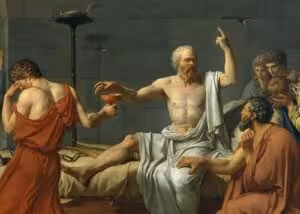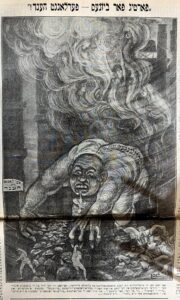Whether arson or accident was the explanation for the fire, Nero continued to be suspected so he felt he had to take action to clear his name from all suspicion of culpability. He singled out the Christians of Rome as the public scapegoats and, in a style very familiar to us today, was able to secure a few traitors among this group who were willing to confess to the crime. Tacitus described Nero’s choice as choosing the notoriously depraved Christians, a phrase that was frequently used in Rome to identify them. They were considered cannibals because they spoke of eating the flesh and drinking the blood of their leader and they were described as incestuous because of their love for one another. To Tacitus, because the Christians’ leader Christ had been executed in Tiberius’ reign by the governor of Judea, Pontus Pilate, thirty years earlier, it was unthinkable that people would continue to be followers of such a criminal. He called their belief a deadly superstition, one that had broken out in Judea in spite of the death of their leader and had now spread to Rome. Tacitus concluded that all degraded and shameful practices seem to collect and even flourish in Rome.
In spite of the explanation proposed by Tacitus for selecting the Christians, it is unlikely that Nero was thinking of their beliefs when he blamed them. He just needed to find an unpopular and defenseless group, which he could blame, and his choice of the Christians was a popular one. They were seen as enemies of the human race because they were strange and, therefore, in the popular mind, always liable to behave in strange ways, perhaps stirring up civil strife or causing violent outbreaks. Strangeness is the term that Romans used to define every foreign cult. There was a strong feeling that only the ancestral gods of Rome ought to be worshipped and the only way to do that was by following traditional procedures. Any adherence to non-Roman religion was superstition, a label that could at any time imply crimes. Many of these superstitions successfully survived in Rome, especially when they happened to be in favor with the authorities, but safety and survival were never assured things.
The Jews too were considered strange and there were about several thousand of them in Rome. They were no more popular than the Christians. Why then were they not the scapegoats selected by Nero? There were two reasons for this: first, some Jews had helped the Roman army on one occasion so they inherited a sort of protected status for a long time. The second reason related to their attempts at revolution in Palestine, which began to appear during Nero’s reign. The Emperor was anxious to avoid any action that would make it difficult for the Roman army in Palestine to stamp out these revolts. There was another development that made it easy for Nero to pick on the Christians. For the thirty years following the execution of their leader, Christians in Rome formed part of the Jewish community and attended their synagogues. A few years before the fire, a letter arrived from Paul, the Apostle, in which he defined the sharp differences between the Jewish ancient religion and the new Christian faith. As a result of this letter, Christians in Rome left the synagogues and met in their own communities. They had become an identifiable group completely separate from the Jewish ones.
Thus began the persecution of Christians in Rome, soon to spread throughout the empire. Hundreds of Roman Christians were arrested and put to death by Nero in the cruelest and farcical ways imaginable. Many were dressed in wild animal skins and torn to pieces by dogs. Others were crucified or made into torches to be lit after dark to illuminate Nero’s gardens. It is probable that the two great Christian leaders, Peter and Paul, both of whom were in Rome at the time of the fire, met their deaths at this time. Tradition indicates that Peter was crucified while Paul was beheaded. So brutal was the treatment of the Christians that people began to feel sorry for them. Romans became convinced that they had nothing to do with the fire and that they were being sacrificed for one man’s mania. Within four years of the fire Nero would be dead. Following rejection by the army and the Roman Senate he took his own life. His fourteen years of rule had ended but the persecutions he had inaugurated went on.
Nero’s extremes seemed to spur the growth of Christianity rather than impede it. Late in the first century, the large numbers of Christians he encountered everywhere made Emperor Domitian decide to send a team of people to Galilee to find out who Jesus was and how he had attained such influence among his followers. Domitian’s period of rule was marked with a series of violent persecutions against any individual or group that was different from the norms of Roman life as he understood it and his thoroughness in attacking Christians is a good example of his treatment of enemies. He discovered that Christians consistently refused to adhere to the imperial cult of Caesar worship and this gave him a rationale for launching a mass execution of Christians wherever he found them. Like Nero before him, his hatred of Christians was not based on any particular aspect of their beliefs but solely because they did not conform to Roman norms. For this reason they, along with other divisive groups, met terrible fates at the hands of Domitian.
A few years after the death of Domitian, when Trajan was emperor, some correspondence about Christians between a regional governor and the emperor, gives a good picture of the status of Christians around the year 100. Trajan, in sharp contrast to Domitian, tended to be sympathetic toward dissident groups but he forbade meetings of secret societies because he thought they might be subversive. This edict, inevitably, clashed with the behavior of Christians. They were different from all others around them and they knew it. Their leader had been crucified because he did not conform to the society within which he grew up. Their only opportunity for social life was to meet privately. They knew that they would get into trouble if they were seen meeting publicly. They posed no threat whatever to Roman authority. Their apostle Paul had made that very clear in his letters of instruction. Nevertheless, in the mind of Trajan, with the empire’s history of rebellions and revolutionaries, secret meetings were dangerous. It was during Trajan’s reign that a letter came to him from Pliny, a governor of one of the regions, asking for clarity about his edict concerning secret societies.
Pliny explained in his letter that he had never been present when Christians were being examined about their loyalty to the Roman Empire but he now was faced with making a decision about some Christians who had been accused of opposing Roman laws. He went on in his letter to outline the procedure he took in these cases but he felt he needed assurance or correction about it because of his inexperience. The procedure he had followed in these particular cases was as follows: he asked each individual whether he or she was a Christian. If the answer was yes he repeated the question two more times, adding at each repetition of the question that serious punishment would follow if the answer continued to be yes. Anyone who persisted with yes three times he punished by sending him or her to Rome. In Pliny’s mind, the Christian’s stubbornness and unshakable obstinacy was something that ought to be punished. He added that he had dismissed those who denied that that they were Christians or who had left the Christian community provided they repeated after him a formula of invocation to the gods, made offerings of wine and incense to your statue, and cursed the name of Christ. Pliny knew that real Christians would never do these things. To make sure that the statements from those who cursed Christ were accurate Pliny investigated what he called the truth, from two slave women, using torture, but found nothing other than a degenerative cult.
The reply from Trajan was a firm endorsement of what he had done and it included an interesting double addition: first, Christians must not be hunted down but only questioned when specific charges are brought before a ruler; second, accusations must not be laid against Christians on the basis of pamphlets that criticize them and are circulated anonymously. This was an interesting recognition of the many conflicts and disagreements about Christianity that circulated at that time. Trajan’s successor, Hadrian, seemed indifferent to Christians although, in all probability, they became involved in the massive purges that he enacted on Jews. If we look farther ahead to the second half of the third century, when Marcus Aurelius was emperor, we find a recurrence of the earlier hatreds. His persecutions of Christians were particularly bloody. Under Emperor Diocletian, at the beginning of the fourth century, violence against Christians began again and lasted for a number of years until, with the conversion of the Emperor Constantine, Christianity became the official religion of the Roman Empire. Perhaps Constantine had learned that persecution always adds more Christians rather than diminishes their numbers.






















